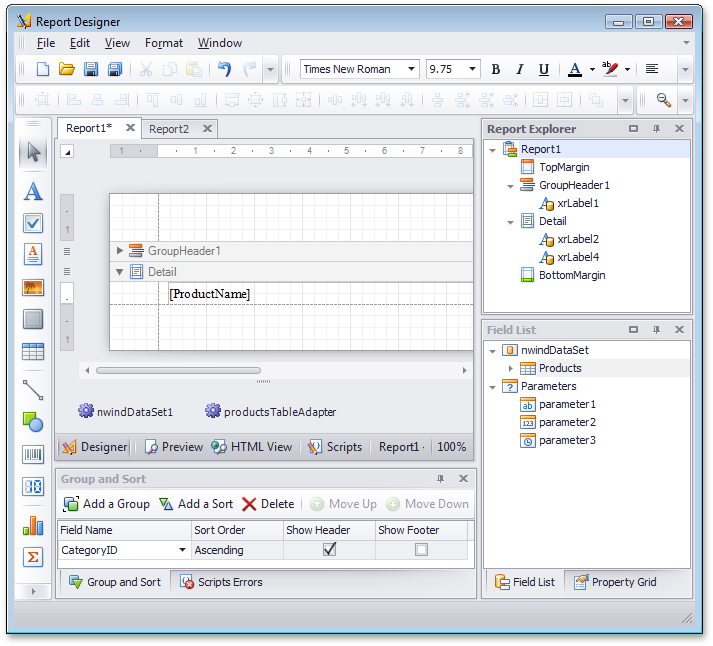 注意 注意 |
|---|
重要说明: .NET Client Profile Framework 不支持此功能。 要在最终用户的机器上使用此功能,则必须安装完整的 .NET Framework。 更多信息,请参阅 Windows 窗体部署 文档中的 关于 .NET Framework 4.0 Client Profile 的重要说明 小节。 |
这个示例展示了如何为特定报表运行标准的 最终用户设计器 窗体,其中使用了 ReportDesignTool、调用了 ReportDesignTool.ShowDesigner 或 ReportDesignTool.ShowDesignerDialog 方法。
注意,在本例中,最终用户设计器被调用两次: 第一次是模态的,第二次则隐藏了 属性网格 和 报表资源管理器(Report Explorer) 窗口。 可以把要隐藏的窗口列表作为参数传递到方法的重载。
要使本示例能正确工作,则派生于 XtraReport 类的 XtraReport1 子类应该存在于示例应用程序中。
| C# |  复制代码 复制代码 |
|---|---|
using System; using System.Windows.Forms; using DevExpress.LookAndFeel; using DevExpress.XtraReports.UI; using DevExpress.XtraReports.UserDesigner; // ... private void button1_Click(object sender, EventArgs e) { ReportDesignTool dt = new ReportDesignTool(new XtraReport1()); // Invoke the standard End-User Designer form, modally. dt.ShowDesignerDialog(); // Invoke the standard End-User Designer form // without the PropertyGrid and ReportExplorer panels. dt.ShowDesigner(UserLookAndFeel.Default, DesignDockPanelType.PropertyGrid | DesignDockPanelType.ReportExplorer); } | |
| Visual Basic |  复制代码 复制代码 |
|---|---|
Imports System Imports System.Windows.Forms Imports DevExpress.LookAndFeel Imports DevExpress.XtraReports.UI Imports DevExpress.XtraReports.UserDesigner ' ... Private Sub button1_Click(ByVal sender As Object, _ ByVal e As EventArgs) Handles button1.Click Dim dt As New ReportDesignTool(New XtraReport1()) ' Invoke the standard End-User Designer form, modally. dt.ShowDesignerDialog() ' Invoke the standard End-User Designer form ' without the PropertyGrid and ReportExplorer panels. dt.ShowDesigner(UserLookAndFeel.Default, _ DesignDockPanelType.PropertyGrid Or DesignDockPanelType.ReportExplorer) End Sub | |
下面的插图展示了 MDI 最终用户设计器窗体。








